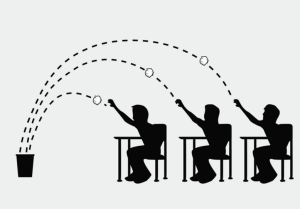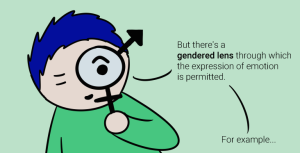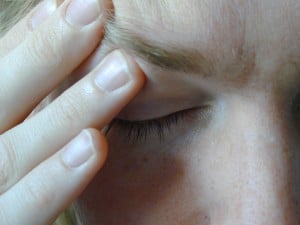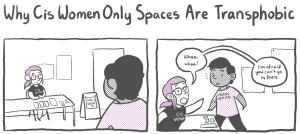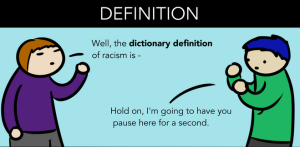
A person with a somber facial expression sits on some steps, resting their head on their hand.
(Content Warning: ableist slurs)
I was meant to finish my degree in 2016. But in April – four months into my final year of studying – I dropped out.
Or, as I prefer to think of it, I took a break from studying until I feel ready to re-enter academia.
There were many reasons why I dropped out, but a big reason is that my mental illnesses were making it nearly impossible to study. My PTSD meant I was struggling to concentrate and write, my depression meant that I felt really unmotivated, and my anxiety prevented me from attending classes and finding help.
Dealing with the symptoms of my mental illness was incredibly difficult. But dealing with ableist microaggressions on campus was even harder.
It was heartbreaking to face ableist slurs on campus. It was heartbreaking to face the implication that my struggle meant I wasn’t working hard enough. It was heartbreaking to deal with lecturers who assumed my mental illness was an excuse to get out of work.
Academic spaces are incredibly tough for many people, including those of us who are mentally ill, because – like nearly everything else in society – universities aren’t immune to oppression. Oppression exists in those spaces, just like it exists everywhere else.
Here are some of the many challenges mentally ill people face at universities and colleges.
Some of these are only applicable to certain universities. Some of these challenges are the fault of university management, while other challenges are a result of campus- and society-wide attitudes.
But all of these can affect mentally ill people deeply. And for that reason, they require us to pay attention and respond with compassion and understanding.
Let’s begin with:
1. Policies – like that at the University of Chicago – that ban trigger warnings.
Trigger warnings can be really useful in helping mentally ill people manage their emotional state.
2. Forcing people to talk in lectures, group discussions, and tutorials.
While this may be a well-intended method of getting everyone involved in discussions, it can be a nightmare for people with social anxiety or executive dysfunction.
3. Forcing people to socialize during initiation or orientation.
4. Initiation ceremonies that involve scaring or humiliating students.
5. Lecturers shaming students who don’t always come to lectures.
I understand that poor attendance can demotivate lecturers, especially when they put a great deal of effort into their lectures.
But the reality is, those of us who have illnesses – both mental and physical – often need time off to take care of ourselves. When we shame people who seldom turn up to lectures, we’re also shaming those who are too ill to attend.
6. Lecturers shaming students who need to leave lectures early.
I’ve occasionally had to leave lectures early because of anxiety. I know it can often come off as rude and disrespectful, but it’s important to practice a bit of empathy here.
Some people might leave lectures early because they’re bored – but many others have valid reasons for leaving early.
7. Lecturers refusing to post lecture notes, even when they can, for those who are absent from class.
Making notes as accessible as possible is essential in supporting mentally ill students.
8. The use of ableist slurs like crazy, psycho, or lunatic in lectures and in social settings.
9. Psychology lectures, seminars, and tutorials where mentally ill people are constantly “othered.”
I’ve attended quite a few lectures where the lecturers and students assumed nobody in the room could possibly have the illnesses they were discussing.
10. Counseling facilities – when they are provided for students – that are expensive, inaccessible, or unprofessional.
11. Complicated processes around applying for leave or handing in sick notes.
Making sick leave inaccessible makes attending universities inaccessible for sick people.
12. The common belief that students who hand work in late are lazy.
13. Being forced to hand in doctor’s notes every time you’re absent.
Some universities have a policy where you can only be excused from a lecture or seminar if you have a medical reason.
Unfortunately, healthcare – psychological and otherwise – isn’t accessible to everyone, and not all of us can see a medical professional every time we need time off.
14. Policies that force people to finish their degree in time or risk losing scholarships, bursaries, or financial aid.
15. On-campus disability campaigns that don’t center those who actually are oppressed by ableism, yet still appear to be progressive and inclusive.
16. Shaming students who drop out or take longer to finish their degrees.
For many people – mentally ill people included – extending their degrees or dropping out is the bravest and wisest decision they can make.
17. Inviting bigoted speakers to speak on university campuses.
18. Policies that don’t effectively discipline abusers.
Not everyone who is abused ends up with a mental illness – but many of us do.
When disciplinary policies make it difficult for people to report abuse, and don’t effectively address abuse, they dismiss our trauma.
Sometimes, we’re forced to choose between our degrees and our sense of safety.
For those of us with PTSD and other illnesses, this is a nightmare.
19. Excessively high tuition.
High tuition affects poor students badly. For poor students who are also mentally ill, the pressure of paying for tuition can be particularly harmful.
This isn’t just because the financial pressure is difficult to deal with, but also because having a mental illness – and paying for therapy and medication – can be expensive on its own. High tuition fees prevent a lot of marginalized people from attending university – including mentally ill folks.
20. Policies that force mentally ill students to see therapists or face expulsion.
At certain universities, students have to agree to attend a therapy program after they take leave for mental health reasons.
This might seem well intended, but therapy isn’t accessible for everyone, nor does it actually work for everyone.
21. The implication that people with degrees are intellectually superior to those without.
There are plenty of reasons why people don’t attend college or finish their course of study. For one, not everyone wants to go to university, and that’s totally okay.
There are also many forms of oppression that make it incredibly difficult to attend university. Ableism is one factor. Classism, racism, sexism, cissexism, and heterosexism are a few other factors.
(Additionally, we must resist the myth that educated people can’t be oppressive.)
22. And of course, ableism is connected to other forms of oppression because all forms of oppression are interlinked.
Experiencing bigotry can be very traumatizing, so for those of us who have mental illnesses and are marginalized in other ways, it can be particularly harmful.
University campuses aren’t free from kyriarchy, and this bigotry also impacts mentally ill people.
***
Academia will never be entirely accessible for everyone. After all, it’s all about judging people by intelligence – something which will always be ableist.
With that in mind, there are plenty of small ways we can make academia a little bit easier.
Lecturers can work to integrate trigger warnings into their lectures. They can make their notes accessible for students. They can be lenient when it comes to students who miss deadlines or classes because of mental illnesses.
Policy-makers can work to create policies that cater to mentally ill students and staff members.
Students can check the ableist attitudes they have, and work to create a student culture that’s more inclusive of marginalized students.
If we can’t eradicate these challenges, we can at least be aware of those challenges and be empathetic towards those who face them.
[do_widget id=’text-101′]
Sian Ferguson is a Contributing Writer for Everyday Feminism and a full-time freelance writer based in South Africa. Her work has been featured on various sites, including Ravishly, MassRoots, Matador Network, and more. She’s particularly interested in writing about queer issues, misogyny, healing after sexual trauma and rape culture. You can follow her on Twitter @sianfergs and read her articles here.
Search our 3000+ articles!
Read our articles about:
Our online racial justice training
Used by hundreds of universities, non-profits, and businesses.
Click to learn more







